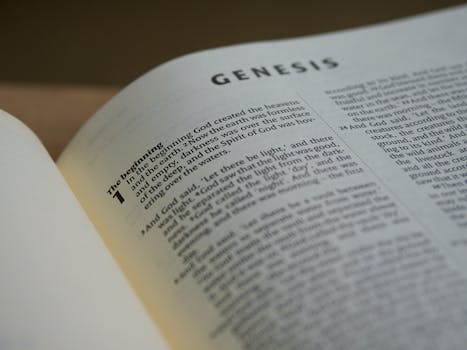-
Table of Contents
Unveiling the Beginnings: Dive into Genesis 9 and explore the origins.
Introduction
Exploring Genesis 9: Unveiling the Beginnings is a book that delves into the biblical text of Genesis 9. It aims to provide a deeper understanding of the origins and significance of various events and themes discussed in this chapter. By examining the context, historical background, and literary aspects of Genesis 9, the book seeks to shed light on the beginnings of important narratives and concepts found within the biblical text.
The Significance of the Rainbow Covenant in Genesis 9
Genesis 9 is a pivotal chapter in the book of Genesis, as it unveils the beginnings of a new era for humanity. This chapter is particularly significant because it introduces the concept of the rainbow covenant, a divine promise made by God to never again destroy the earth by a flood. The rainbow covenant holds great importance in understanding the relationship between God and humanity, and its implications are far-reaching.
The rainbow covenant is introduced in Genesis 9:12-17, where God says to Noah, “This is the sign of the covenant that I make between me and you and every living creature that is with you, for all future generations: I have set my bow in the cloud, and it shall be a sign of the covenant between me and the earth.” This covenant is a symbol of God’s faithfulness and mercy towards humanity, despite their sinful nature.
The significance of the rainbow covenant lies in its promise of protection and preservation. God assures Noah and his descendants that He will never again bring a flood to destroy the earth. This promise serves as a reminder of God’s love and care for His creation, and it provides a sense of security and hope for humanity. The rainbow, with its vibrant colors spanning the sky, serves as a visual representation of this covenant, a constant reminder of God’s faithfulness.
Furthermore, the rainbow covenant also highlights the importance of obedience and righteousness. In Genesis 9:13, God says, “I will see it and remember the everlasting covenant between God and every living creature of all flesh that is on the earth.” This implies that the rainbow serves as a reminder not only for humanity but also for God Himself. It is a reminder of the covenant that was made and the responsibilities that come with it.
The rainbow covenant also has implications for the relationship between God and humanity. It signifies a new beginning, a fresh start for humanity after the devastating flood. It symbolizes God’s desire to restore and reconcile with His creation. Through this covenant, God extends His grace and forgiveness to humanity, offering them a chance to start anew and walk in righteousness.
Moreover, the rainbow covenant serves as a testament to God’s sovereignty and power. It demonstrates His ability to control the forces of nature and His authority over creation. By placing His bow in the clouds, God establishes His dominion over the earth and asserts His role as the ultimate ruler.
In conclusion, the significance of the rainbow covenant in Genesis 9 cannot be overstated. It represents God’s promise of protection and preservation, His faithfulness and mercy towards humanity, and His desire for reconciliation. The rainbow serves as a constant reminder of these truths, a symbol of hope and assurance for all generations. It also underscores the importance of obedience and righteousness in our relationship with God. Ultimately, the rainbow covenant reveals the beginnings of a new era, a fresh start for humanity, and a testament to God’s sovereignty and power.
Unraveling the Story of Noah and the Ark in Genesis 9

Exploring Genesis 9: Unveiling the Beginnings
Genesis 9 is a chapter in the Bible that holds great significance in the story of Noah and the Ark. This section of the book of Genesis unravels the aftermath of the great flood and sheds light on the covenant that God establishes with Noah and his descendants. Through a careful examination of Genesis 9, we can gain a deeper understanding of the origins of humanity and the divine plan that unfolds.
The chapter begins with God blessing Noah and his sons, instructing them to be fruitful and multiply, filling the earth with their offspring. This command signifies the continuation of life after the catastrophic flood, emphasizing the importance of human existence and the divine purpose behind it. It is a reminder that despite the destruction that occurred, God’s plan for humanity remains intact.
As the narrative progresses, God establishes a covenant with Noah, promising never to destroy all flesh with a flood again. This covenant is symbolized by the appearance of a rainbow in the sky, serving as a reminder of God’s faithfulness and mercy. It is a powerful symbol of hope and restoration, signifying the end of God’s wrath and the beginning of a new era for humanity.
Within this covenant, God also grants Noah and his descendants dominion over the animals of the earth. This responsibility highlights the unique role that humans play in God’s creation, as stewards and caretakers of the natural world. It is a call to exercise wise and compassionate stewardship, recognizing the interconnectedness of all living beings and the importance of preserving the earth for future generations.
Furthermore, Genesis 9 addresses the issue of bloodshed and establishes the principle of capital punishment. God declares that whoever sheds the blood of a human being shall have their own blood shed, emphasizing the sanctity of human life and the consequences of taking it unjustly. This command serves as a foundation for the establishment of justice and order within society, ensuring that the value of human life is upheld and protected.
In addition to these significant themes, Genesis 9 also provides insight into the genealogy of Noah’s sons and the dispersion of humanity across the earth. The chapter concludes with the account of Noah’s drunkenness and the subsequent actions of his sons, which reveal the complexities of human nature and the challenges that arise within family dynamics.
Overall, Genesis 9 offers a rich tapestry of theological and moral teachings, unveiling the beginnings of humanity and the divine plan that unfolds after the great flood. It emphasizes the importance of human life, the need for stewardship, and the establishment of justice within society. Through the covenant with Noah, God demonstrates His faithfulness and mercy, providing a glimmer of hope amidst the devastation. As we delve into the depths of Genesis 9, we are invited to reflect on our own place in God’s grand design and the responsibilities that come with it.
Exploring the Themes of Redemption and Renewal in Genesis 9
Exploring Genesis 9: Unveiling the Beginnings
Genesis 9 is a pivotal chapter in the book of Genesis, as it marks a significant turning point in the narrative of the Bible. This chapter unveils the beginnings of redemption and renewal, themes that are central to the overall message of the Bible. In this article, we will delve into the depths of Genesis 9, examining the key events and exploring the profound implications they hold.
The chapter begins with God’s covenant with Noah and his descendants. After the devastating flood that wiped out all life on earth, God establishes a new covenant with Noah, promising never to destroy the earth by flood again. This covenant is a symbol of God’s grace and mercy, as He extends His hand of redemption to humanity. It is a powerful reminder that even in the face of judgment, God’s love and compassion prevail.
As part of this covenant, God gives Noah and his descendants the responsibility to be fruitful and multiply, filling the earth with life once again. This command echoes the original mandate given to Adam and Eve in the Garden of Eden, highlighting the theme of renewal. Despite the brokenness and sinfulness of humanity, God provides a way for restoration and new beginnings.
In Genesis 9, we also encounter the establishment of a new relationship between humans and animals. God grants permission for humans to eat meat, but with one crucial condition – they must not consume the blood. This prohibition emphasizes the sanctity of life and the respect we should have for all living creatures. It serves as a reminder that even in our dominion over the earth, we are called to be responsible stewards, treating all of God’s creation with care and reverence.
Another significant event in Genesis 9 is the rainbow, which God sets as a sign of His covenant with Noah and all living creatures. The rainbow serves as a visual reminder of God’s faithfulness and His promise to never again destroy the earth by flood. It is a symbol of hope and a testament to God’s enduring love for His creation. The rainbow also points to the ultimate redemption and renewal that will come through Jesus Christ, who is the fulfillment of God’s covenant with humanity.
In exploring the themes of redemption and renewal in Genesis 9, we see a foreshadowing of the ultimate redemption and renewal that will be accomplished through Jesus Christ. Just as God provided a way for Noah and his family to be saved from the flood, He has provided a way for all of humanity to be saved from the consequences of sin through the sacrifice of His Son, Jesus. Through His death and resurrection, Jesus offers forgiveness, restoration, and new life to all who believe in Him.
Genesis 9 serves as a powerful reminder of God’s faithfulness and His desire to redeem and renew His creation. It is a chapter that unveils the beginnings of a grand narrative that unfolds throughout the Bible, culminating in the ultimate redemption and renewal found in Jesus Christ. As we delve into the depths of Genesis 9, may we be reminded of the incredible love and grace of our Creator, and may we embrace the opportunity for redemption and renewal that He offers us.
Q&A
1. What is the main focus of Exploring Genesis 9: Unveiling the Beginnings?
The main focus of Exploring Genesis 9: Unveiling the Beginnings is to provide an in-depth exploration of the biblical book of Genesis, specifically chapter 9, which delves into the beginnings of humanity and God’s covenant with Noah.
2. Who is the author of Exploring Genesis 9: Unveiling the Beginnings?
The author of Exploring Genesis 9: Unveiling the Beginnings is Dr. John Phillips, a renowned biblical scholar and author.
3. What can readers expect to gain from reading Exploring Genesis 9: Unveiling the Beginnings?
Readers can expect to gain a deeper understanding of the biblical text, its historical context, and its relevance to their own lives. The book aims to provide insights into the origins of humanity, God’s plan for redemption, and the significance of Noah’s covenant.
Conclusion
In conclusion, Exploring Genesis 9: Unveiling the Beginnings provides a comprehensive analysis of the biblical text in Genesis 9. The book delves into the origins of humanity, the covenant between God and Noah, and the significance of the rainbow as a symbol of that covenant. Through careful examination and interpretation, the author sheds light on the deeper meanings and implications of this pivotal chapter in the Bible. Overall, this book offers valuable insights for those seeking a deeper understanding of the beginnings described in Genesis 9.

